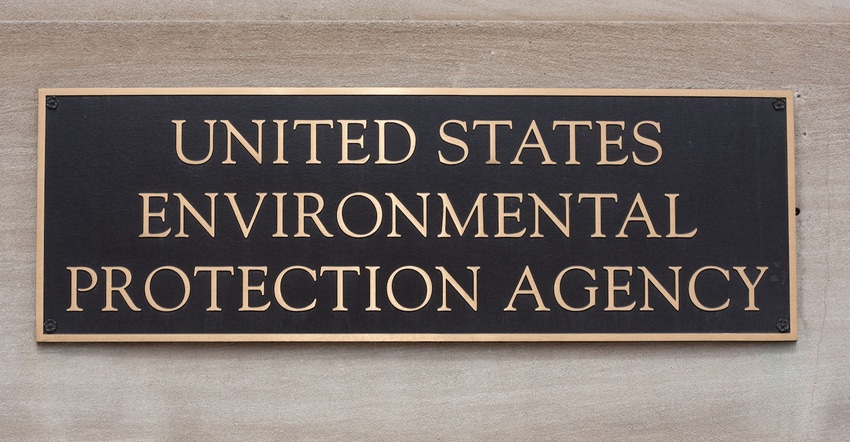Five more 2017 small refiner exemptions approved for RFS, and two more petitions received for 2018 exemptions.

The Environmental Protection Agency revealed five more small refinery exemptions from the federal mandates of the Renewable Fuel Standard (RFS).
The approval of five additional small refinery exemptions to the 2017 RFS volumes brings the total loss of demand to 2.6 billion gal. for the 2016-17 compliance years. According to EPA, 1.82 billion renewable identification numbers (RINs) have been exempted from the 2017 RFS compliance year. That’s the equivalent of more than 900 million bu. of lost corn grind demand, according to the Iowa Corn Growers Assn.
Under the RFS, refineries producing transportation fuel must demonstrate each year that they have blended certain volumes of renewable fuel into gasoline or diesel fuel or acquired credits from others as RINs, representing all of part of those volume obligations. The RFS allows certain “small” refineries – those with a throughput of fewer than 75,000 barrels per day – to petition EPA for a temporary extension of an exemption from the renewable fuel volume requirements for a given year if they can show that compliance would impose a “disproportionate economic impact” on them. EPA is required to consult with the U.S. Department of Energy to determine whether to grant an exemption.
“EPA’s decision to grant five more small refinery exemptions is a slap in the face to rural communities, where farmers have lost a key market for their crops and biofuel plants have shut down or idled production,” Growth Energy chief executive officer Emily Skor said. “EPA continues to hand out exemptions to unidentified refiners, which only strengthens our serious concern that EPA continues to enrich some of the most profitable oil refineries in the world -- all in secret.”
The National Biodiesel Board (NBB) also condemned the small refinery exemptions. “The 2017 volumes for biomass-based diesel were set at 2 billion gal., well below the industry’s proven ability to produce fuels. Now, the retroactive small refinery exemptions for 2017 have cut the obligation by a total of 240 million gal., or 12%. Because they’re retroactive exemptions, the reduced demand for biomass-based diesel will hit our industry throughout 2019,” NBB vice president of federal affairs Kurt Kovarik said.
The five new small refinery exemptions reduced the 2017 renewable volume obligation (RVO) for biomass-based diesel and biodiesel by an additional 48 million gal. Previously granted exemptions had reduced the 2017 RVO by 192 million gal. EPA’s small refinery exemptions for 2015, 2016 and 2017 have now reduced biomass-based diesel demand by more than 360 million gal.
EPA also noted that two more petitions have been received for 2018 exemptions, bringing the total to 39, the Renewable Fuels Assn. (RFA) said in a statement.
Data released by the Energy Information Administration (EIA) revealed the extensive damage to 2018 ethanol demand that resulted from EPA’s small refinery exemptions. Under the direction of former EPA Administrator Scott Pruitt, 48 refiners were excused from their legal blending obligations under the RFS, resulting in a flood of RINs into the market and a subsequent collapse in RIN prices.
RFA detailed that the wave of surplus RINs reduced the incentive to expand ethanol blending beyond the so-called E10 “blend wall,” while low RIN prices pressured ethanol values and margins throughout 2018.
According to the RFA analysis of the new EIA data, U.S. ethanol consumption declined to 14.38 billion gal. in 2018 from 14.49 billion gal. in 2017. Based on the EIA forecast in January 2018 (i.e., before the market became aware of small refinery exemptions), U.S. ethanol consumption was expected to reach 14.66 billion gal. -- 276 million gal. more than what actually occurred.
In addition, the U.S. ethanol blend rate fell to 10.07% in 2018 from 10.13% in 2017. The blend rate began to drop in February 2018 as rumors and press reports regarding small refinery exemptions made their way into the market. This was far below expectations at the start of 2018, when EIA had forecasted an implied ethanol blend rate of 10.26% for 2018. For the February-to-December period, the blend rate averaged just 10.01%.
RFA president and CEO Geoff Cooper stated, “As expected, EIA’s latest data confirms that small refiner exemptions caused both the ethanol blend rate and the total ethanol volume consumed to drop in 2018. This was the first year-over-year decline in U.S. ethanol consumption since 1998, breaking a 20-year trend of annual increases in domestic ethanol demand.”
Cooper added, “The RFS was created to preserve the environment, protect America's energy security and give Americans more affordable options at the pump. These exemptions undercut those goals, and today’s exemptions mean more than 2.6 billion gal. of RFS blending obligations have been erased with the stroke of EPA’s pen. RFA will continue to fight these exemptions through the courts and urge EPA to adopt a more judicious and restrained decision-making process on refiner exemptions as well as restore lost volume obligations from previous years.”
In 2018, Growth Energy and allied organizations filed a lawsuit in the D.C. Circuit Court of Appeals and a related administrative petition with EPA on the misuse of small refiner exemptions.
Additionally, Growth Energy and RFA filed another lawsuit in federal district court in August 2018 alleging that EPA and the U.S. Department of Energy have improperly denied agency records requested by Growth Energy, RFA and others under the Freedom of Information Act.
About the Author(s)
You May Also Like



.png?width=300&auto=webp&quality=80&disable=upscale)

